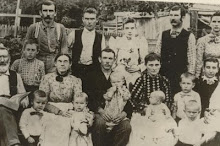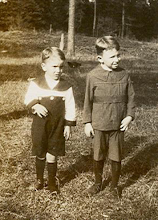FAIRPLAY, Texas
By Dr. V.M. Holland
Location: On US No.79 in West-Central Panola Co.
In 1836, Elijah Allred, after coming from Randolph County, N.C., to fight in the Texas Revolution, arrived in Nacogdoches to find the Revolution to be over. He decided to remain in Texas and was advised that there was land to be had for a reasonable price to the north of Nacogdoches off of Trammel’s Trace. In 1836 he built his simple log cabin about ¼ mile north of where the store now stands. His nearest neighbors were the Daniel Martin family near Tatum and Isaak Reed’s settlement near Clayton.
Within a short time this section of Panola County was rapidly filled with settlers. In 1838, Purviance Willaims and his brother John H. Williams arrived from Tennessee. Both had large families. In the same year, Abner Herrin, from Camden, Tennessee, Edward Sweat from Tennessee, and the Elijah Wyatt family, consisting of two sons and three daughters all with families, settled in the community. Stephen Allred with his son-in-law James Robinson arrived from North Carolina in 1841. He was a brother of Elijah Allred. Samuel Gentry, with a large family, came from Alabama in 1847. John M. Tompkins and Chris Barbee came from Georgia in the same year. In 1848 Spencer and Alford Harri, brothers, came from Tennessee with their families. John Allison with his son Thomas G. Allison, both with families, moved into the community from the North East side of Panola County in 1849. Leonard B. Murray with his family came from South Carolina in the same year. Wesley C. Sealy came from Mississippi in 1853, and Daniel Shaw came from Alabama in 1858. These are most of the families who remained several years in the community and who settled there before 1860.
It is of some interest to note, that of these first settlers in the community of Fairplay, although most came to Texas from Tennessee, the following were born in North Carolina:
Elijah Allred, Purviance Williams, Stephen Allred, Edward Sweat, Spencer Harris, Alford Harris, John Allison, Daniel Shaw. This patter of migration is repeated in most section of East Texas. North Carolina has been called the cradle of the southern and western states, because it was to a large extent the intrepid and at times irascible Scots from North Ireland who settled most of the North Carolina back country, that continued their westward march to play a major role in settling the whole tier of southern states and many of the western states as well.
Bethesda, later Allison’s Chapel, the Methodist church was organized between 1837 and 1839, at a log building near the Williams cemetery. It was moved to approximately its present site in 1868. Although most of the early settlers appeared to have been Baptist, a Baptist church was nor organized until 1869.
Fairplay Post Office was started in 1851 with J. F. Gill being appointed the first postmaster. Except for the Civil War Period, a post office remained until 1904 with the advent of rural free delivery. Mordicai G. Harris was the last Postmaster.
Fairplay has had some form of school since the early 1840’s. Until 1868, when the building burned, the school was taught in the church near the William’s Cemetery. Since 1868 at least three school buildings have stood on a site about ¼ mile north of the store.
Fairplay’s first store was located about a mile north of the present store, and was run by James Heifner who came from Kentucky in 1853. Alter John Allison arrived in the community he dug wells for a camping site, and established a blacksmith shop and a tan yard near the site of the present store. Later he built a store also which he, and later his sons, continued to operate until it was sold to Spencer Harris in 1882.
Tuesday, September 22, 2009
Friday, August 21, 2009
Stories are the changing colors of your family tree.
Stories are the changing colors of your family tree.
A glimpse into the lives of relatives helps you understand how your family became who they are.
Plan visits to grandparents, aunts, uncles and cousins with the mission of gathering
reminiscences of earlier years and any information on the family background. It’s a good idea to tape-record these sessions. (My suggestion is we video tape the interview with the child asking the questions and the older relative answering the questions.)
Every family has fascinating stories that make a real connection to history — the depression, World Wars, civil rights, etc. Some relatives need a little coaxing, but here’s where the kids come in handy.
People are more willing to open up to a child. Other than genealogy questions about dates and names, you will want to ask some of these to help spark some good stories.
What’s the favorite thing you remember about your mother/ father when you were a child?
What were your grandparents like?
How were birthdays celebrated in your family?
What was the best present you ever received?
Were you in the military?
What did you do?
What is your favorite family recipe?
Tell me about your first car.
Did you share your room?
What was your house like?
What chores were you responsible for?
What was your school like?
Who was your favorite teacher?
What was your favorite book as a child?
Tell me something you got in trouble for.
A glimpse into the lives of relatives helps you understand how your family became who they are.
Plan visits to grandparents, aunts, uncles and cousins with the mission of gathering
reminiscences of earlier years and any information on the family background. It’s a good idea to tape-record these sessions. (My suggestion is we video tape the interview with the child asking the questions and the older relative answering the questions.)
Every family has fascinating stories that make a real connection to history — the depression, World Wars, civil rights, etc. Some relatives need a little coaxing, but here’s where the kids come in handy.
People are more willing to open up to a child. Other than genealogy questions about dates and names, you will want to ask some of these to help spark some good stories.
What’s the favorite thing you remember about your mother/ father when you were a child?
What were your grandparents like?
How were birthdays celebrated in your family?
What was the best present you ever received?
Were you in the military?
What did you do?
What is your favorite family recipe?
Tell me about your first car.
Did you share your room?
What was your house like?
What chores were you responsible for?
What was your school like?
Who was your favorite teacher?
What was your favorite book as a child?
Tell me something you got in trouble for.
One of the goals of this Blog is to Expand the Living History of the Holland Family to other Media
You find ideas for how to do a family history in interesting places... like your local Kroger cereal asle.
I was shopping and thinking about how to do a DVD project for the Holland Reunion in a couple of years with family members filming on cellphones and digital video cameras material to be put on a DVD for August 13, 2011 AD.
If you want to participate post a comment here are email me at fredddallas@gmail.com . I will be hosting the Fairplay Holland Union on August 14, 2010 AD. Let's get together and share some ideas.
Here is one... read the back of this cereal box. (Just click on the image to enlarge it.)
Fred Holland


I was shopping and thinking about how to do a DVD project for the Holland Reunion in a couple of years with family members filming on cellphones and digital video cameras material to be put on a DVD for August 13, 2011 AD.
If you want to participate post a comment here are email me at fredddallas@gmail.com . I will be hosting the Fairplay Holland Union on August 14, 2010 AD. Let's get together and share some ideas.
Here is one... read the back of this cereal box. (Just click on the image to enlarge it.)
Fred Holland


Subscribe to:
Posts (Atom)






